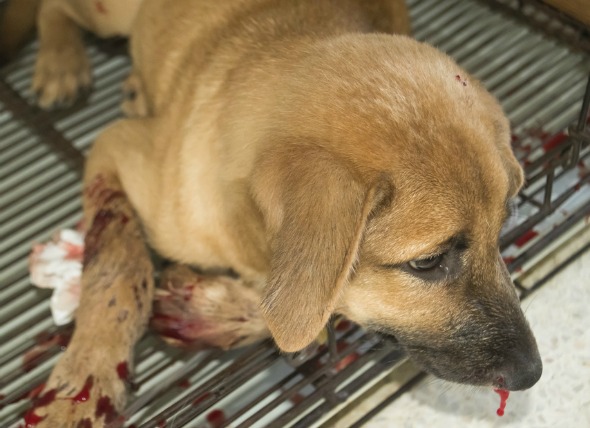

Hematemesis, or the vomiting of blood, can be the result of a number of causes. There may be a disruption in the lining of the tube connecting the mouth and stomach (esophagus), or an irritation of the stomach or intestines, which can lead to inflammation, bleeding, and, eventually, the expulsion of blood through vomiting. Alternatively, the blood may originate from an inflammation or injury in the mouth or lungs (respiratory system), after which it is swallowed and then thrown up (regurgitated).
Hematemesis is relatively common in dogs, and can affect a wide range of systems depending on the source. The gastrointestinal system may be affected due to trauma, ulcer, inflammation, or the presence of a foreign object. A hemorrhage may affect the heart (cardiovascular system), resulting in a heart murmur and/or low blood pressure. Abnormally fast breathing due to severe hemorrhage can also occur. A clotting disorder (coagulopathy) can lead to hemorrhage in the stomach or intestines, and can also lead to hematemesis.
The primary symptom is the presence of blood in vomit, which may appear as fresh blood, formed clots, or digested blood which resembles coffee grounds. Other symptoms include lack of appetite (anorexia), abdominal pain, and blackish tar-like feces (melena).
A physical examination may also find a low red blood cell count (anemia), in which case additional symptoms can include heart murmur, weakness to the point of collapse, and a rapid heartbeat.
Recommended Online Pharmacy: Get a Veterinary Diet for Sensitive Stomach at Pet360.com
A wide variety of causes may be responsible for hematemesis. Gastrointestinal diseases, such as inflamed bowels from inflammatory bowel disease (IBD), or ulcers, can both be causes for hematemesis. Various metabolic, neurological, respiratory and viral infections may be responsible for incidents of hematemesis, as can conditions such as liver failure, head trauma, or heartworm, respectively,
Coagulopathy, or lack of proper blood clotting, may result from liver failure, or a reduced blood platelet count (thrombocytopenia) due to drug exposure. Ingestion of rat poison may also be a cause of improper blood clotting. Hematemesis may also follow a traumatic incident, such as severe burns, heat stroke, major surgery, exposure to poisons from heavy metals, such as iron or lead, and snake bites. Exposure to toxic plants and pesticides may also cause vomiting of blood.
Critically ill animals are at a higher risk for hematemesis. Other factors that can increase the risk of hematemesis are certain drugs, such as NSAIDs, or non-steroidal anti-inflammatories; shock; or thrombocytopenia - a reduced blood platelet count.
Tests for diagnosis include blood tests, and urine and fecal analysis. Imaging tests such as ultrasound and X-ray may also be used to pinpoint inner disturbances. Through these diagnostic tests, the diagnosis for hematemesis may range from any number of the aforementioned causes, from contact with toxic substances to liver damage.
Treatment varies greatly depending on the cause of hematemesis. Any underlying cause must be treated upon diagnoses. After this cause is identified and removed, if vomiting is no longer excessive, recovery may continue at home. For severe internal bleeding, ulcer perforation, or excessive vomiting, in-patient care may require emergency treatment for hemorrhage or shock, or there may be the need for blood transfusions or IV treatment to replace fluids lost in excessive vomiting.
A delicate diet of highly digestible foods is recommended after incidents of hematemesis. Foods should be low in dietary fat and low in fiber so that the digestive system is not stressed. Further care is dependent upon the cause and consequent treatment given for hematemesis.
Hematemesis due to the ingestion of toxic substances can be avoided by ensuring that animals do not have access to poisonous plants and foods. In other instances, a healthy diet may aid against illnesses related to hematemesis.
 Nose Bleed in Dogs
Epistaxis in Dogs
A bleeding nose can come from s
Nose Bleed in Dogs
Epistaxis in Dogs
A bleeding nose can come from s
 Lower Eyelid Droop in Dogs
Ectropion in Dogs
Ectropion is a condition which
Lower Eyelid Droop in Dogs
Ectropion in Dogs
Ectropion is a condition which
 Low Blood Calcium in Dogs
Hypocalcemia in Dogs
If your dog has lower than n
Low Blood Calcium in Dogs
Hypocalcemia in Dogs
If your dog has lower than n
 Cardiac Arrest in Dogs
Cardiopulmonary Arrest in Dogs
Cardiac arrest (al
Cardiac Arrest in Dogs
Cardiopulmonary Arrest in Dogs
Cardiac arrest (al
 Kneecap Dislocation in Dogs
Patellar Luxation in Dogs
Patellar luxation occur
Kneecap Dislocation in Dogs
Patellar Luxation in Dogs
Patellar luxation occur
Copyright © 2005-2016 Pet Information All Rights Reserved
Contact us: www162date@outlook.com